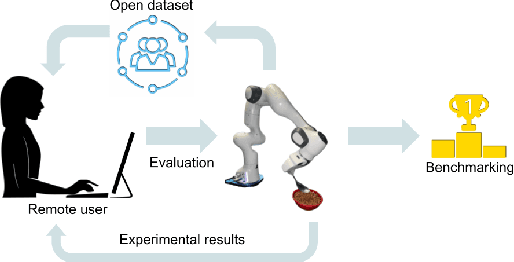Aryan Jain
Train Offline, Test Online: A Real Robot Learning Benchmark
Jun 01, 2023



Abstract:Three challenges limit the progress of robot learning research: robots are expensive (few labs can participate), everyone uses different robots (findings do not generalize across labs), and we lack internet-scale robotics data. We take on these challenges via a new benchmark: Train Offline, Test Online (TOTO). TOTO provides remote users with access to shared robotic hardware for evaluating methods on common tasks and an open-source dataset of these tasks for offline training. Its manipulation task suite requires challenging generalization to unseen objects, positions, and lighting. We present initial results on TOTO comparing five pretrained visual representations and four offline policy learning baselines, remotely contributed by five institutions. The real promise of TOTO, however, lies in the future: we release the benchmark for additional submissions from any user, enabling easy, direct comparison to several methods without the need to obtain hardware or collect data.
Where are we in the search for an Artificial Visual Cortex for Embodied Intelligence?
Mar 31, 2023



Abstract:We present the largest and most comprehensive empirical study of pre-trained visual representations (PVRs) or visual 'foundation models' for Embodied AI. First, we curate CortexBench, consisting of 17 different tasks spanning locomotion, navigation, dexterous, and mobile manipulation. Next, we systematically evaluate existing PVRs and find that none are universally dominant. To study the effect of pre-training data scale and diversity, we combine over 4,000 hours of egocentric videos from 7 different sources (over 5.6M images) and ImageNet to train different-sized vision transformers using Masked Auto-Encoding (MAE) on slices of this data. Contrary to inferences from prior work, we find that scaling dataset size and diversity does not improve performance universally (but does so on average). Our largest model, named VC-1, outperforms all prior PVRs on average but does not universally dominate either. Finally, we show that task or domain-specific adaptation of VC-1 leads to substantial gains, with VC-1 (adapted) achieving competitive or superior performance than the best known results on all of the benchmarks in CortexBench. These models required over 10,000 GPU-hours to train and can be found on our website for the benefit of the research community.
 Add to Chrome
Add to Chrome Add to Firefox
Add to Firefox Add to Edge
Add to Edge